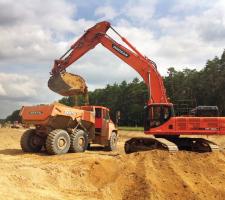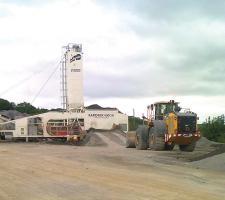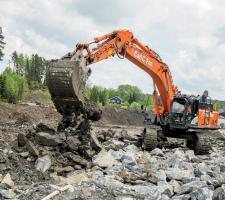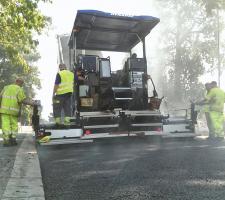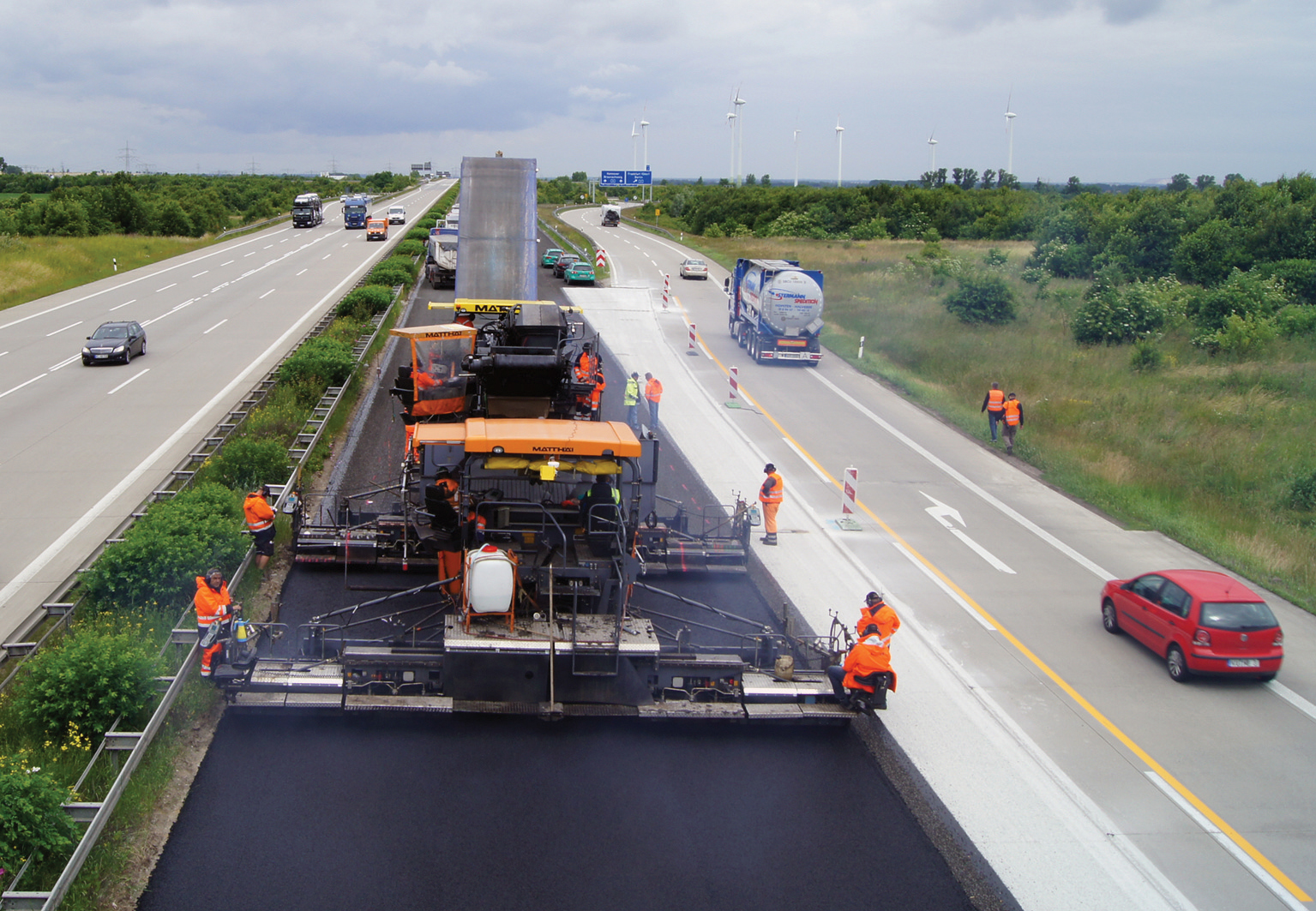
Despite recent economic uncertainties and governments’ efforts to reduce costs, road construction in Europe is still big business writes Patrick Smith.
While new road construction in certain countries may have been reduced, work is still being carried out as are repairs and upgrades.
Scheduled for completion in the summer of 2014 is a Norwegian project where contractor, Carl C Fon, has secured its largest-ever road construction contract to complete a 4.6km section of the E18 in the Mysen region.(The E18 European route runs from Craigavon in Northern Ireland, through parts of Scotland, England, Norway, Sweden and Finland to St Petersburg in Russia).
It started the €25 million project in August 2012 and it is scheduled for completion in the summer of 2014.
The Sandefjord-based company’s fleet of
There is a large deficit of stone on the land, which consists mainly of clay, and this is being overcome by bringing in aggregates from a national rail construction project at Holmestrand.
The challenging E18 contract will make way for an impressive new four-lane highway, complete with central reservation and a 100km/hour speed limit. It will also include the construction of four new bridges and a 150m tunnel.
Traffic has already been moved on to the new southbound road, allowing for the completion of the northbound carriageway.
The old route, which will remain open for local traffic, has only two lanes, with variable speed limits of between 50-80km/hour.
The overall aims of the E18 expansion project are to enhance road safety by avoiding urban areas, and to reduce journey times, such is the case for the improvements that are being made to the section of the route through Mysen.
Carl C Fon has engaged a total of nine Hitachi excavators on the project (one wheeled and eight crawler machines), including the new ZX250LC-5; two ZX470LCH-5s and a ZX670LCH-5, plus five articulated dump trucks, two bulldozers and two other excavators.
A team of 30-35 personnel has been working on the project on an 11-hour, four-day (Monday to Thursday) week.
“This is the biggest job that the company has worked on to date,” says owner Carl Christian Fon.
“Prior to this, our largest contract would have been around €8 million. As the main contractor, we are responsible for everything from the drainage to the earthmoving and construction of the highway up to, but not including, the asphalt, bridges and concrete work.
“The ground here is relatively soft, due to the high clay content, and so we are using the lightest machinery that the job will allow. We have invested in a range of new Zaxis-5 excavators from the official Hitachi dealer
“The total cost of ownership is very important and we assess the running costs and resale value of each machine before making a purchase decision.”
German company Moba says that more vehicles travelling on motorways are placing increasing strain on roadways and due to these high loads and because of construction defects, roads often crack after just a few years and potholes and ruts form.
“The costs for road construction in Germany have risen by one-quarter since just 2005. This makes it all the more important for the responsible authorities to achieve optimum results when constructing and resurfacing roads in order to increase the longevity of the roadways and avoid premature repair work and, thus, additional costs,” says Moba.
The Saxony-Anhalt state road construction authority (LSBB), responsible for the construction and maintenance of roadways in Saxony-Anhalt, has for the first time tested a new temperature measurement system during a partial resurfacing of the A14 near Magdeburg.
With the Moba PAVE-IRScan system the temperature is measured over the entire area during paving, and using this data it is possible to draw conclusions about possible weak points in the road.
The system was tested in cooperation with construction company Matthäi on the road where approximately 15,000 vehicles/day roll over the ageing motorway.
“Previously, it was only possible to measure the temperature on a random basis. With the system, this is possible over the entire area and continuously for the entire project,” says engineer Guido Schwabe, who oversees the construction work on behalf of the LSBB.
Further PAVE-IR tests will be carried out at the start of 2014. The system is expected to be available for the European market in early summer 2014.
Also in Germany, Thannhauser + Ulbricht Straßen- und Tiefbau of Fremdingen, is upgrading the B 2 federal highway near the town of Roth, and is employing four new
The B 2 runs the entire length of the country for a distance of 845km from north to south. South of Nuremberg, it forms an important connection between the city of Nuremberg and Augsburg. Due to the high volume of traffic, a stretch of 3.6km is being widened from two to four lanes near Roth.
Part of the road to be doubled in size requires the construction of an additional carriageway and a new bridge, while some 275,000m³ of excavated earth has to be moved (quality material will be improved and put back while the rest will be taken away from the site).
Due to the high proportion of sand in the ground, coupled with heavy rainfall saturating and softening the earth, the composition of the excavated soil made it unsuitable for hauling away with conventional construction site trucks.
Tannhauser + Ulbricht began a search for a company that could provide it at short notice with four ADTs and a 50tonne excavator on a long-term lease basis.
Rühle Maschinenpark met the requirement, supplying the five heavy-duty machines within ten days.
The Doosan DA30 ADT offers a load capacity of 28tonne, and is powered by a five-cylinder
The 50 tonne Doosan DX490LC-3 crawler excavator is a new generation machine, powered by the proven
For use on nationwide pavement construction applications
It was recently used to produce some 39,000tonnes of CBGM (cement bound granular material) working as a sub-contractor to Lafarge Tarmac Contracting South Wales for Sisk Roadbridge on the A477 St Clears to Red Roses improvement in Wales. The Welsh government-funded 9.3km long new-build road project will improve the road network from St Clears to Pont Newydd.
Northern Ireland-based
“The use of hydraulic bound materials in new-build road construction is increasing, and the Rapidmix plant is a very useful addition to increase Lafarge Tarmac’s capability and flexibility to produce high quality site mixed materials,” says Kevin Marshall, contract production manager in construction solutions.
Recently updated to incorporate full weighing options for all materials (aggregates, cement and water) the new generation Rapidmix 400 and 600CW offers fully-automated record-keeping.
Fully mobile and self-contained, the Rapidmix is said to offer a complete plant powered by its own power source, with on-board compressor and generator. Fitted with a self-erecting system, using hydraulics, the plant can change from travel mode to fully operational within a few hours.
The Rapidmix 400/600 CW mixes up to 400 or 600tonnes/hour depending on application, and provides feed rates that are fully adjustable for the aggregate, cement and water systems.
Also in the UK, O’Hara Bros Surfacing has added a Dynapac SD2500WS paver to its fleet for work across London’s road network.
Established over 35 years ago, the company has its own aggregates division based in North London, and it takes on contracts across the capital on some of London’s busiest and most prestigious roads. It expanded its paver fleet to cope with the increasing demand in London and surrounding areas.
“Our work tends to be very demanding requiring high amounts of asphalt being laid in short time frames. That’s why we need pavers we can rely on and back-up we can count on,” says Michael O’Hara, operations director for the surfacing company.


